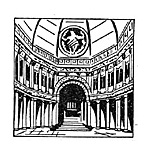
A Machiavellian on the Throne of Peter?
NEW OXFORD NOTEBOOK
“It is well to seem merciful, faithful, humane, sincere…. For men in general judge more by the eyes than by the hands, for every one can see, but very few have to feel. Everybody sees what you appear to be, few feel what you are…. The masses are always impressed by the superficial appearance of things.” — Machiavelli in The Prince
He’s the greatest dissembler the papacy has ever known. What other conclusion can be drawn from the most recent, R-rated episode of The Francis Follies?
In case you didn’t tune in, here’s what you missed: On May 20, during a closed-door meeting with 200 Italian bishops, the Holy Father reportedly uttered the Italian term checche, a slur describing stereotypically effeminate homosexual men, and told those gathered that “there is already enough faggotry” (troppa frociaggine) in Catholic seminaries.
Correspondents and talking heads were stunned. Conservatives had a field day with it while the liberal media cognoscenti clucked and tut-tutted. Surely, Francis didn’t mean that. Perhaps it was a slip of the Petrine tongue?
Within short order, the Holy See’s Press Office — accustomed as it is to sweeping up the Big Guy’s many messes — issued a statement, saying, “The pope never meant to offend or express himself with homophobic terms, and he issues his most sincere apologies to all those who felt offended by the use of a term reported by others.”
As apologies go, that’s blatantly insincere. Genuine apologies express remorse for something one has said or done, not for how somebody else feels about what one has said or done. The press office might as well have said, The Pope is sorry you’re a sensitive snowflake.
As for the peculiar phrase “a term reported by others”: Is that supposed to cast doubt on reports of the event, or on the prelates who leaked the Pope’s untoward words? If he didn’t say what he’s reported to have said, then issue a denial! Nobody would believe it, of course, so here we are.
You May Also Enjoy
The evidence is clear that our society will decompose, long before the human species dies out, when the traditional family is dethroned from its place of honor.
The Vatican evidently wants neither to ban nor not ban homosexuals from the priesthood, since it again chose to do neither in a recently-issued document on clerical formation.
Bishop Schneider of Kazakhstan says in Rome today, churchmen "live in a climate of threats and of denial of dialogue towards a specific group" — that is, towards anyone not in lockstep with Francis's reform movement.

